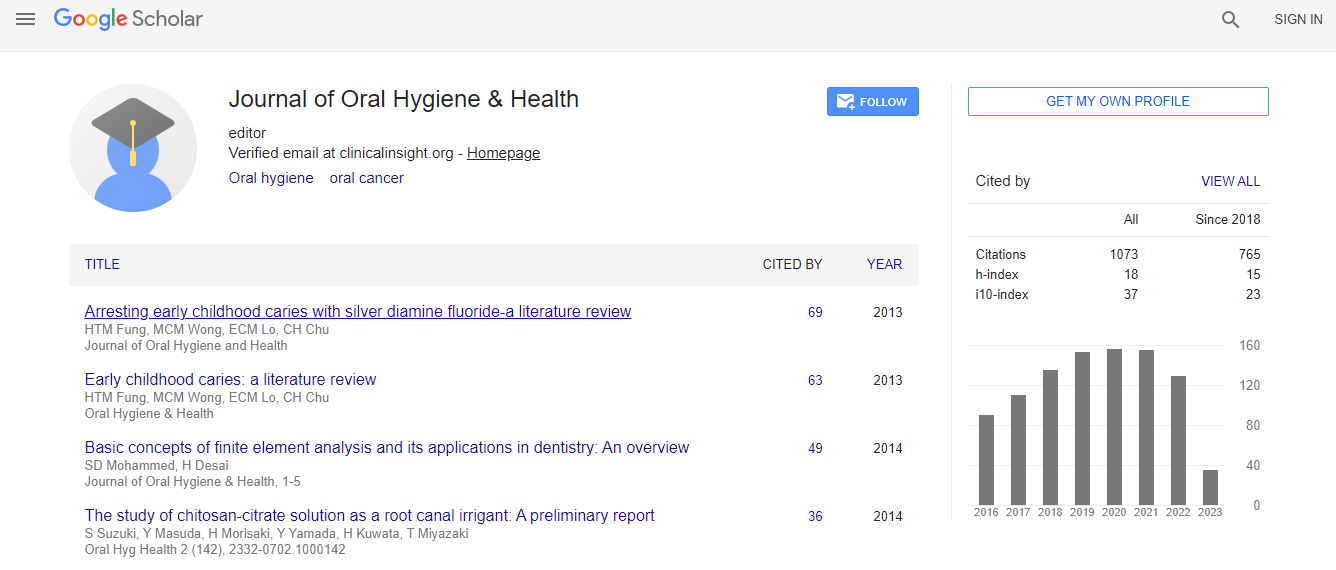Our Group organises 3000+ Global Conferenceseries Events every year across USA, Europe & Asia with support from 1000 more scientific Societies and Publishes 700+ Open Access Journals which contains over 50000 eminent personalities, reputed scientists as editorial board members.
Open Access Journals gaining more Readers and Citations
700 Journals and 15,000,000 Readers Each Journal is getting 25,000+ Readers
Google Scholar citation report
Citations : 1073
Journal of Oral Hygiene & Health received 1073 citations as per Google Scholar report
Journal of Oral Hygiene & Health peer review process verified at publons
Indexed In
- Index Copernicus
- Google Scholar
- Open J Gate
- JournalTOCs
- RefSeek
- Hamdard University
- EBSCO A-Z
- OCLC- WorldCat
- Publons
- Geneva Foundation for Medical Education and Research
- Euro Pub
- ICMJE
Useful Links
Recommended Journals
Related Subjects
Share This Page
Establishment of a topography analytical method for activity prediction of nano-submicro-micro hybrid titanium surfaces
Annual Congress on Endodontics, Orthodontics, Prosthodontics and Dental Implants
Qiaojie Luo, Weiwei Lao and Xiaodong Li
Zhejiang University, China
ScientificTracks Abstracts: J Oral Hyg Health
Abstract
Dential implants of micro topographical surfaces have been widely used in clinic and has obtained high success rate, through the mechanism of increasing the local factor levels to produce an osteogenic environment. Nowadays, nontopographical features are hoped to improve osteointegration and surfaces of Nano-Submicro-micro hybrid topography are prized in biomaterial research. However, to obtain the Nano-Submicro-micro hybrid topographical implant of desirable property is hit-and-miss, without guidance or quantitative topographical parameters to predict biological performance. In the present study, we constructed a series of titanium surfaces of Nano-Submicro-micro topographical feature, through the combination of sandblasting, acid etching and alkali treatment. With the increase time in alkali treatment, the Nano-scale structure strengthened with the micro and Submicro scale structures weakened. In vitro and in vivo studies showed that the osteogenesis of these surfaces, increased first and then decreased. We constructed a set of SEM-image dependent topography analytical methods to quantitatively analyze the topography features of each scales. Based on the series titanium surfaces with high consistence in surface chemistry, matter phase structures and the topography analytical methods, we found that the complexity of structure in each scale played important role in biological activity and it was the sum of complexity in all scales that determined the overall performance of the implant. In further study, we will analyze more surfaces to refine the analysis method and would be a promising model to predict the surfaces of the highest bioactivity in a specific topographical series of implant surfaces.Biography
Qiaojie Luo has completed her PhD degree from Zhejiang University and her Postdoctoral research in 2017. Currently, she is focusing on the surface modification of dental implants and osseointegration mechanism of titanium.
E-mail: luoqiaojie@zju.edu.cn

 Spanish
Spanish  Chinese
Chinese  Russian
Russian  German
German  French
French  Japanese
Japanese  Portuguese
Portuguese  Hindi
Hindi 
